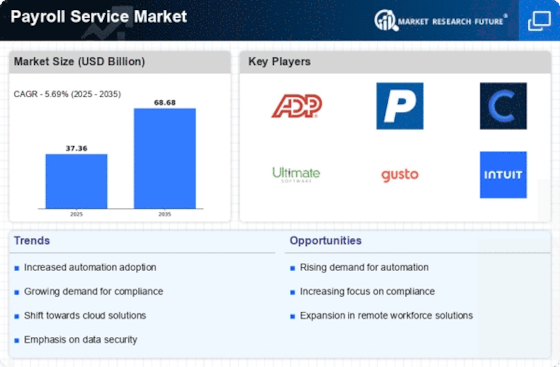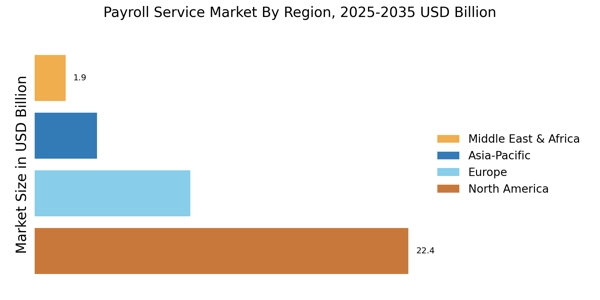Global Workforce Mobility
The increasing mobility of the workforce is significantly impacting the Payroll Service Market. As businesses expand their operations internationally, they encounter diverse payroll requirements across different jurisdictions. This complexity necessitates the use of specialized payroll services that can manage multi-currency transactions, varying tax laws, and compliance issues. In 2025, it is projected that the demand for payroll services catering to expatriates and remote workers will grow by approximately 25%. Companies are seeking solutions that can seamlessly integrate payroll processes across borders, ensuring that employees are compensated accurately and on time, regardless of their location. Thus, workforce mobility emerges as a crucial driver for the Payroll Service Market.
Technological Advancements
Technological advancements play a pivotal role in shaping the Payroll Service Market. The integration of artificial intelligence, machine learning, and cloud computing into payroll systems enhances efficiency and accuracy. In 2025, it is projected that the adoption of cloud-based payroll solutions will account for over 60% of the market share, as businesses increasingly recognize the benefits of real-time data access and automated processes. These technologies not only streamline payroll processing but also reduce human error, thereby improving overall service quality. Furthermore, the ability to analyze payroll data for strategic decision-making is becoming a crucial factor for organizations. Consequently, the ongoing technological evolution is a key driver for growth in the Payroll Service Market.
Regulatory Compliance Requirements
The Payroll Service Market is increasingly influenced by the need for compliance with various regulations. Governments worldwide impose stringent labor laws, tax regulations, and reporting requirements that businesses must adhere to. This compliance necessity drives organizations to seek reliable payroll services that can ensure adherence to these regulations. In 2025, it is estimated that The Payroll Service will reach a valuation of approximately 10 billion USD, reflecting a growing demand for services that can navigate complex legal landscapes. As companies expand their operations across borders, the complexity of compliance increases, further propelling the need for specialized payroll services. Thus, the regulatory environment serves as a significant driver for the Payroll Service Market.
Rise of Outsourcing Payroll Functions
The trend of outsourcing payroll functions is a notable driver in the Payroll Service Market. Many organizations are opting to delegate payroll responsibilities to specialized service providers to focus on core business activities. This shift is particularly evident among small to medium-sized enterprises (SMEs) that may lack the resources to manage payroll in-house. In 2025, it is estimated that the outsourcing segment will account for nearly 40% of the total payroll services market. By outsourcing, companies can benefit from expert knowledge, reduce operational costs, and ensure compliance with evolving regulations. This trend underscores the growing reliance on external payroll services, thereby propelling the Payroll Service Market forward.
Increased Focus on Employee Experience
The Payroll Service Market is witnessing a shift towards enhancing employee experience. Organizations are increasingly recognizing that payroll is not merely a transactional function but a critical component of employee satisfaction. In 2025, studies indicate that companies investing in user-friendly payroll systems are likely to see a 20% increase in employee engagement. This trend is driven by the demand for transparency in payroll processes and the desire for employees to access their payroll information easily. As businesses strive to attract and retain talent, the emphasis on a positive payroll experience becomes paramount. Therefore, the focus on employee experience serves as a significant driver for the Payroll Service Market.

















